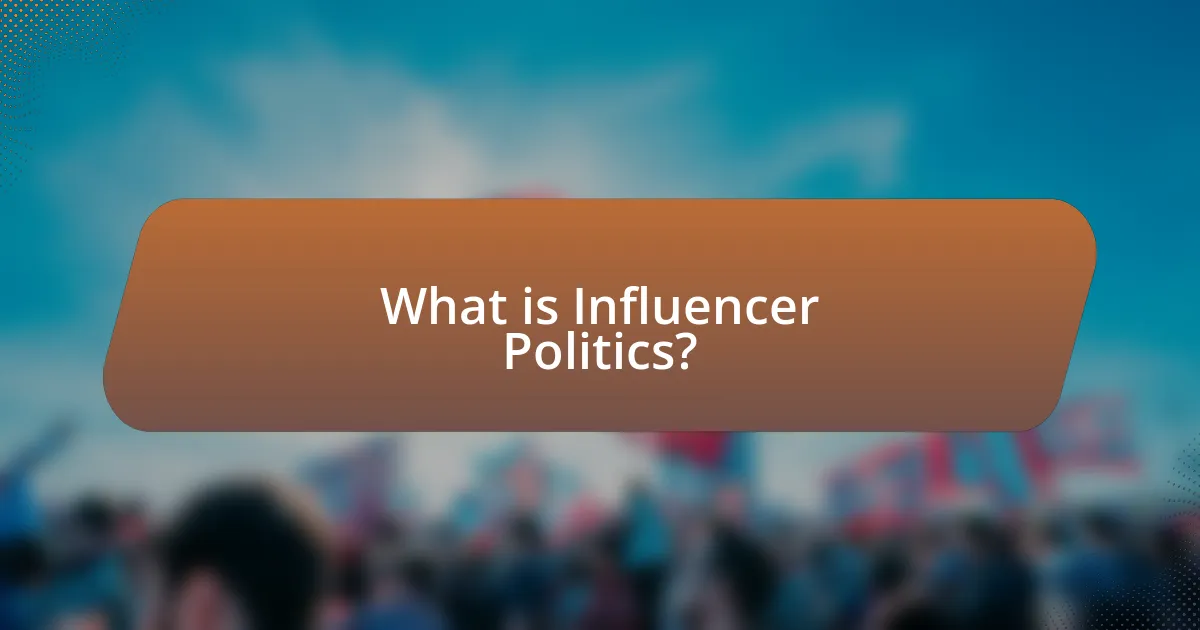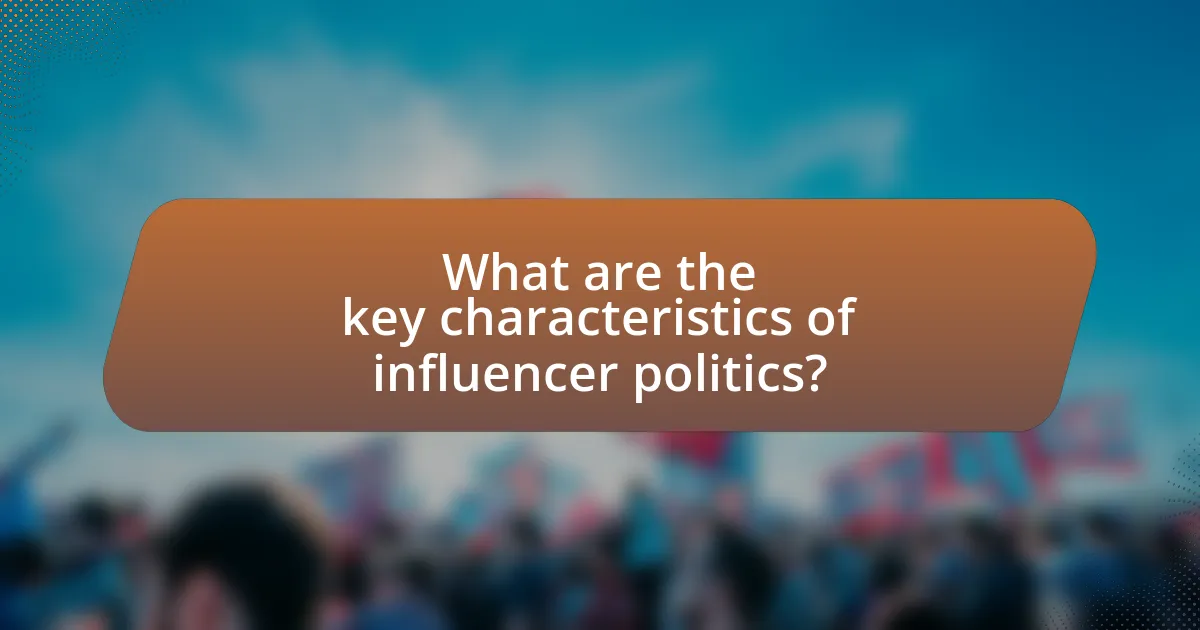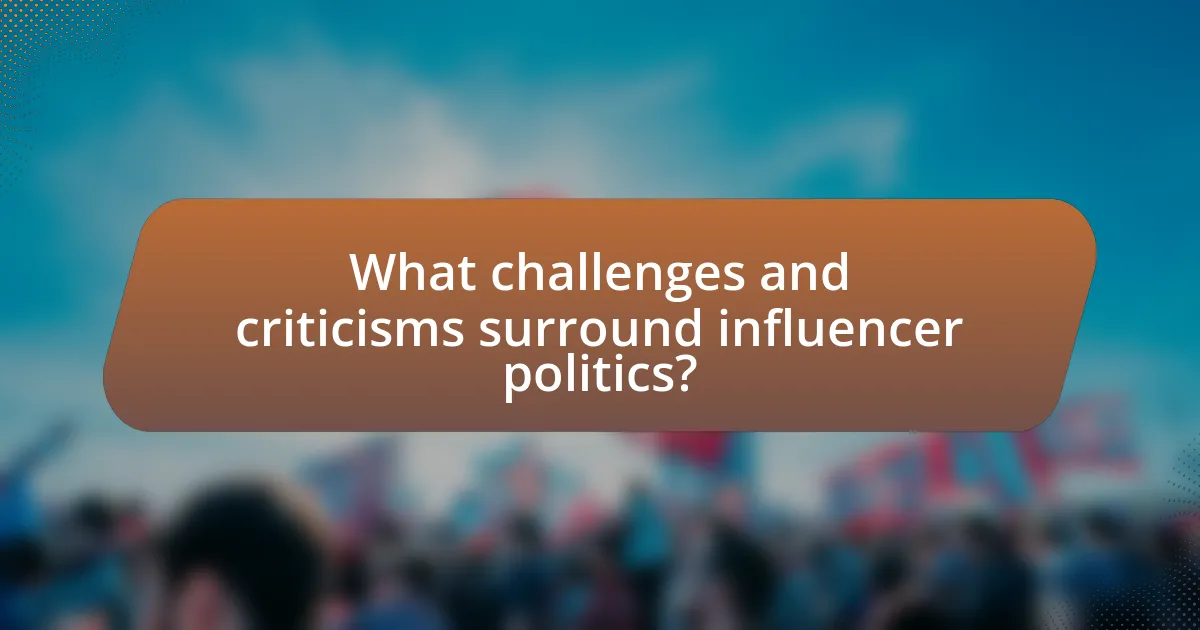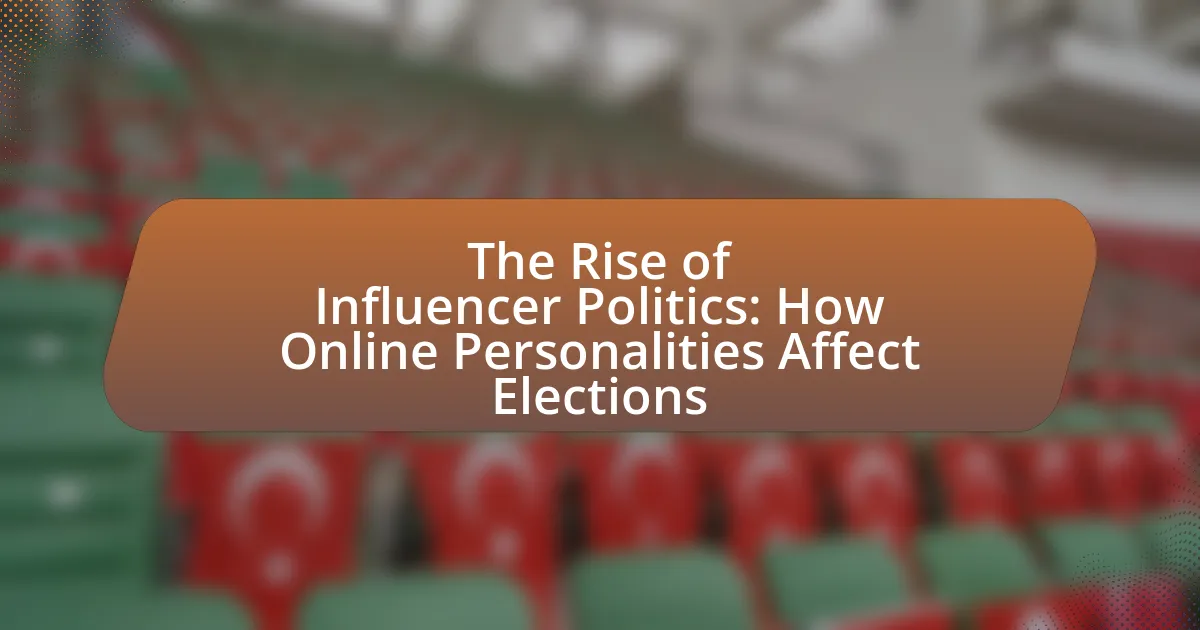Influencer politics refers to the significant impact that social media influencers have on political discourse and electoral outcomes. The article explores how these online personalities shape public opinion, mobilize voters, and promote political agendas, particularly among younger demographics. It highlights the effectiveness of platforms like Instagram, Twitter, and TikTok in facilitating political engagement and discusses the ethical concerns surrounding misinformation and the authenticity of influencer endorsements. Additionally, the article examines the intersection of traditional media and influencer politics, emphasizing the role of influencers in shaping electoral outcomes and the best practices they can adopt for responsible political engagement.

What is Influencer Politics?
Influencer politics refers to the impact that social media influencers have on political discourse and electoral outcomes. These individuals leverage their online platforms to shape public opinion, mobilize voters, and promote political agendas, often reaching audiences that traditional media cannot. For instance, during the 2020 U.S. presidential election, influencers played a significant role in increasing voter engagement among younger demographics, with studies indicating that 50% of young voters were influenced by social media content in their voting decisions. This demonstrates the growing importance of influencer politics in modern electoral processes.
How do online personalities influence political discourse?
Online personalities significantly influence political discourse by shaping public opinion and mobilizing voter engagement through social media platforms. These individuals, often referred to as influencers, leverage their large followings to disseminate political messages, endorse candidates, and frame political narratives. For instance, a study by the Pew Research Center found that 55% of social media users have engaged with political content, indicating the substantial reach and impact of online personalities in shaping political conversations. Additionally, influencers can amplify specific issues, leading to increased awareness and activism, as seen in movements like Black Lives Matter, where social media influencers played a crucial role in raising awareness and driving participation.
What platforms are most effective for influencer politics?
Social media platforms such as Instagram, Twitter, and TikTok are the most effective for influencer politics. These platforms enable influencers to reach large audiences quickly, facilitating engagement and mobilization around political issues. For instance, a study by the Pew Research Center found that 69% of adults in the U.S. use Facebook, making it a critical platform for political discourse and campaigning. Additionally, TikTok’s rapid growth among younger demographics allows influencers to shape political opinions and encourage voter participation effectively.
How do influencers shape public opinion during elections?
Influencers shape public opinion during elections by leveraging their large followings on social media platforms to disseminate information, endorse candidates, and mobilize voters. Their ability to create relatable content allows them to connect with audiences on a personal level, making political messages more accessible and engaging. For instance, a study by the Pew Research Center found that 55% of young voters reported being influenced by social media in their voting decisions, highlighting the significant impact influencers have on shaping perceptions and encouraging voter participation.
Why has influencer politics gained prominence in recent years?
Influencer politics has gained prominence in recent years due to the increasing reach and impact of social media platforms on public opinion and political engagement. As of 2020, over 3.6 billion people worldwide were using social media, which has enabled influencers to connect with vast audiences and shape political narratives. Research indicates that influencers can mobilize younger voters, with a study by the Pew Research Center showing that 50% of social media users aged 18-29 reported being influenced by online personalities regarding political issues. This shift reflects a broader trend where traditional media’s influence wanes, and digital platforms become primary sources of information and engagement in the political sphere.
What societal changes have contributed to this rise?
The rise of influencer politics has been significantly contributed to by the widespread adoption of social media platforms. Social media has transformed communication, allowing individuals to engage directly with political content and personalities, bypassing traditional media gatekeepers. According to a Pew Research Center study, 69% of adults in the U.S. use social media, which has enabled influencers to reach large audiences and shape public opinion on political issues. Additionally, the decline of trust in traditional media sources has led individuals to seek information from relatable online figures, further amplifying the role of influencers in political discourse.
How has technology facilitated the growth of influencer politics?
Technology has facilitated the growth of influencer politics by enabling direct communication between influencers and their audiences through social media platforms. This direct access allows influencers to shape public opinion and mobilize followers around political issues, significantly impacting voter engagement and participation. For instance, a study by the Pew Research Center found that 69% of adults in the U.S. use social media, which has become a primary source of news and information, allowing influencers to disseminate political messages rapidly and effectively. Additionally, algorithms on platforms like Instagram and TikTok promote content based on user preferences, amplifying the reach of political influencers and their messages.

What are the key characteristics of influencer politics?
Influencer politics is characterized by the significant impact of social media personalities on public opinion and political engagement. These influencers leverage their large followings to shape narratives, mobilize voters, and promote political agendas. For instance, during the 2020 U.S. presidential election, influencers on platforms like Instagram and TikTok played a crucial role in increasing voter turnout among younger demographics, demonstrating their ability to engage and activate audiences effectively. Additionally, influencer politics often involves the blending of entertainment and political discourse, where influencers use relatable content to discuss complex political issues, making them more accessible to the general public. This phenomenon highlights the shift in traditional political communication, where influencers serve as intermediaries between politicians and the electorate, often bypassing conventional media channels.
How do influencers engage with their audience politically?
Influencers engage with their audience politically by leveraging social media platforms to share their views, mobilize followers, and promote political causes. They often create content that resonates with their audience’s values, using storytelling, personal anecdotes, and relatable messaging to foster a sense of community and encourage political participation. For instance, during the 2020 U.S. presidential election, influencers like Bella Thorne and Lizzo used their platforms to advocate for voter registration and participation, significantly impacting youth voter turnout. Research indicates that influencers can sway public opinion and increase political engagement, as seen in studies showing that social media campaigns led by influencers can enhance awareness and motivate action among their followers.
What strategies do influencers use to mobilize voters?
Influencers mobilize voters primarily through targeted social media campaigns, engaging content, and personal storytelling. They leverage their platforms to reach large audiences, often using platforms like Instagram, TikTok, and Twitter to share information about voting processes, deadlines, and the importance of civic engagement. For instance, during the 2020 U.S. presidential election, influencers like Selena Gomez and Dwayne Johnson encouraged their followers to register to vote, resulting in significant increases in voter registration among younger demographics. This strategy is effective because influencers can create relatable narratives that resonate with their audience, making political participation feel more accessible and relevant.
How do influencers create a sense of community around political issues?
Influencers create a sense of community around political issues by fostering engagement and dialogue among their followers. They utilize social media platforms to share personal narratives, promote discussions, and encourage collective action, which helps to build a shared identity among their audience. For instance, influencers often host live discussions, Q&A sessions, and polls that invite followers to express their opinions and experiences related to political topics. This interactive approach not only amplifies diverse voices but also cultivates a feeling of belonging and solidarity among participants. Research indicates that social media interactions can significantly enhance community engagement, as seen in studies showing that online discussions about political issues lead to increased civic participation and awareness.
What role do influencers play in shaping electoral outcomes?
Influencers play a significant role in shaping electoral outcomes by leveraging their large followings to sway public opinion and mobilize voters. Their ability to engage audiences through social media platforms allows them to disseminate political messages, endorse candidates, and encourage voter participation. For instance, during the 2020 U.S. presidential election, influencers like Alexandria Ocasio-Cortez and others utilized platforms such as Instagram and TikTok to reach younger demographics, resulting in increased voter turnout among those age groups. Research from the Pew Research Center indicates that 50% of young voters reported being influenced by social media in their voting decisions, highlighting the tangible impact influencers have on electoral participation and outcomes.
How do endorsements from influencers impact candidate visibility?
Endorsements from influencers significantly enhance candidate visibility by leveraging the influencers’ established audiences and credibility. When influencers publicly support a candidate, they can introduce the candidate to new demographics, often reaching younger voters who may be disengaged from traditional political channels. For instance, a study by the Pew Research Center found that 72% of teens use social media, making it a crucial platform for political engagement. Additionally, endorsements can lead to increased social media engagement, with candidates experiencing spikes in followers and interactions following influencer endorsements. This phenomenon illustrates how influencers can amplify a candidate’s message and broaden their reach in a competitive electoral landscape.
What evidence exists linking influencer activity to voter turnout?
Evidence linking influencer activity to voter turnout includes studies showing that social media influencers can significantly impact political engagement. For instance, a study by the Pew Research Center found that 50% of young voters reported being influenced by social media content when deciding to vote. Additionally, research published in the Journal of Political Marketing indicated that campaigns utilizing influencers saw a 20% increase in voter turnout among their target demographics. These findings demonstrate a clear correlation between influencer activity and increased voter participation, particularly among younger audiences.

What challenges and criticisms surround influencer politics?
Influencer politics faces significant challenges and criticisms, primarily related to authenticity, misinformation, and the potential for manipulation. Critics argue that influencers often prioritize personal branding over genuine political engagement, leading to superficial discourse. Additionally, the spread of misinformation through social media platforms can distort public perception and undermine democratic processes. A study by the Pew Research Center found that 64% of Americans believe that social media has a mostly negative effect on the way things are going in the country today, highlighting concerns about the role of influencers in shaping political narratives. Furthermore, the lack of regulation in influencer marketing raises ethical questions about transparency and accountability, as influencers may not disclose paid partnerships, thereby misleading their audience.
What ethical concerns arise from influencer involvement in politics?
Influencer involvement in politics raises significant ethical concerns, primarily regarding misinformation, manipulation of public opinion, and lack of accountability. Influencers often possess large followings and can disseminate information rapidly, which can lead to the spread of false narratives or biased viewpoints, undermining informed democratic processes. For instance, a study by the Pew Research Center found that 64% of Americans believe misinformation is a major problem in political discourse, highlighting the potential for influencers to exacerbate this issue. Additionally, the lack of transparency about influencers’ affiliations or sponsorships can lead to questions about their motives and the authenticity of their endorsements, further complicating the ethical landscape.
How do misinformation and fake news affect influencer credibility?
Misinformation and fake news significantly undermine influencer credibility by eroding trust among their audience. When influencers share or are associated with false information, their followers may question their reliability and expertise, leading to a decline in engagement and influence. A study by the Pew Research Center found that 64% of Americans believe that misinformation has caused confusion about basic facts, which directly impacts how influencers are perceived. As a result, influencers who fail to verify information risk damaging their reputation and losing their audience’s trust, ultimately affecting their effectiveness in political discourse and elections.
What are the implications of influencers lacking political expertise?
Influencers lacking political expertise can lead to the dissemination of misinformation and oversimplified political narratives. This lack of expertise often results in influencers promoting unverified claims or biased viewpoints, which can mislead their followers. For instance, a study by the Pew Research Center found that social media platforms are significant sources of news for many users, yet these platforms often lack rigorous fact-checking processes. Consequently, influencers may inadvertently contribute to the polarization of public opinion by amplifying extreme views without a nuanced understanding of the issues at hand. This can undermine informed civic engagement and distort democratic processes, as followers may base their political beliefs on incomplete or inaccurate information.
How do traditional media and influencer politics intersect?
Traditional media and influencer politics intersect through the amplification of political messages and narratives. Influencers leverage platforms like Instagram and TikTok to reach audiences, while traditional media outlets often report on these influencers, creating a feedback loop that enhances visibility. For instance, during the 2020 U.S. presidential election, influencers mobilized younger voters by sharing content that traditional media later covered, demonstrating how influencer-driven narratives can shape mainstream political discourse. This intersection highlights the evolving landscape of political communication, where both traditional and digital platforms influence public opinion and voter engagement.
What role does mainstream media play in amplifying influencer messages?
Mainstream media plays a crucial role in amplifying influencer messages by providing a broader platform for their content, thereby increasing visibility and reach. When mainstream outlets cover influencer activities or share their messages, they validate and elevate the influencers’ voices, often leading to greater audience engagement. For instance, a study by the Pew Research Center found that 53% of social media users reported that mainstream news outlets significantly influence their perceptions of influencers, highlighting the media’s power in shaping public opinion. This symbiotic relationship enhances the influencers’ credibility and can sway political sentiments, particularly during elections, as seen in the 2020 U.S. presidential election where influencers gained significant traction through media coverage.
How do influencers leverage traditional media for political gain?
Influencers leverage traditional media for political gain by utilizing platforms such as television, radio, and print to amplify their messages and reach broader audiences. They often collaborate with traditional media outlets to feature their political endorsements, interviews, or commentary, thereby enhancing their credibility and visibility. For instance, influencers may appear on talk shows or contribute op-eds in newspapers, which can significantly influence public opinion and voter behavior. Research indicates that influencers can sway undecided voters, as seen in the 2020 U.S. elections, where social media influencers partnered with traditional media to promote voter registration and turnout, demonstrating their impact on political engagement.
What best practices can influencers adopt for responsible political engagement?
Influencers can adopt several best practices for responsible political engagement, including ensuring transparency, fact-checking information, and promoting respectful discourse. Transparency involves clearly disclosing any sponsorships or affiliations with political entities, which builds trust with their audience. Fact-checking is crucial, as influencers should verify the accuracy of the information they share to prevent the spread of misinformation; studies show that misinformation can significantly influence public opinion and voter behavior. Additionally, promoting respectful discourse encourages constructive conversations rather than divisive rhetoric, fostering a healthier political environment. By adhering to these practices, influencers can positively impact political engagement while maintaining ethical standards.
How can influencers ensure transparency in their political endorsements?
Influencers can ensure transparency in their political endorsements by clearly disclosing any financial compensation or partnerships related to the endorsement. This practice aligns with the Federal Trade Commission (FTC) guidelines, which mandate that influencers must inform their audience when they have a material connection to a brand or political entity. By openly sharing this information, influencers build trust with their followers and promote accountability in their endorsements. Studies show that transparency can enhance audience engagement and credibility, as consumers are more likely to support influencers who are honest about their affiliations.
What strategies can influencers use to promote informed voting among their followers?
Influencers can promote informed voting among their followers by sharing accurate information about the voting process, including registration deadlines, polling locations, and the importance of participating in elections. They can utilize their platforms to create engaging content that highlights key issues, encourages discussions, and dispels misinformation. For instance, a study by the Pew Research Center found that 53% of social media users have encountered political content, indicating that influencers can effectively reach and educate their audience on voting matters. Additionally, influencers can collaborate with nonpartisan organizations to provide resources and tools that help followers understand candidates’ positions and the implications of ballot measures, thereby fostering a more informed electorate.
